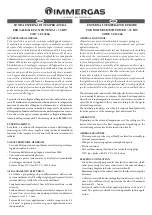
30
WHL-032 REV. 6.2.16
Figure 16
– Condensate Piping with Condensate Neutralizer / Condensate Piping with Condensate Neutralizer and Pump
NOTES:
1. Condensate line must be pitched at least 1/4" per foot to properly drain. If this cannot be done, or a very long length of condensate hose is
used, you must increase the condensate line to a minimum of 1” ID and place a tee in the line after the condensate neutralizer to properly
reduce vacuum lock in the drain line.
2. Plastic pipe should be the only material used for the condensate line. Steel, brass, copper, or other materials will be subject to corrosion or
deterioration.
3. NEVER install condensate lines outside. It is very important that the condensate line is not exposed to freezing temperatures or any type of
blockage. Damages due to frozen or blocked condensate lines ARE NOT covered by warranty.
4. Support of the condensate line may be necessary to avoid blockage of the condensate flow.
If using a condensate pump, select one approved for use with condensing boilers and furnaces. The pump should have an overflow
switch to prevent property damage from condensate spillage.
It is very
important that the condensate piping be no smaller than ¾”. To prevent sagging and maintain pitch, condensate piping should
be supported with pipe supports, and pitched ¼” per foot to allow for proper drainage.
The condensate line must remain unobstructed, allowing free flow of condensate. If condensate freezes in the line, or if line is
obstructed in any other manner, condensate can exit from the tee, resulting in potential water damage to property.
PART 7 – GAS PIPING
FIRE AND/OR EXPLOSION HAZARD
To avoid serious injury or death, the gas line installation and the gas line inlet pressure test must be done by a licensed professional.
Always match the boiler with the type of gas supplied to the unit (natural gas or LP gas). Propane ready boilers hav
e the suffix “LP”
after the model serial number.
Make sure the gas line pressures are within normal limits. Pressures outside normal limits can result in poor performance and
hazardous operating conditions.
Failure to follow these guidelines could result in property damage, personal injury, or death.
















































